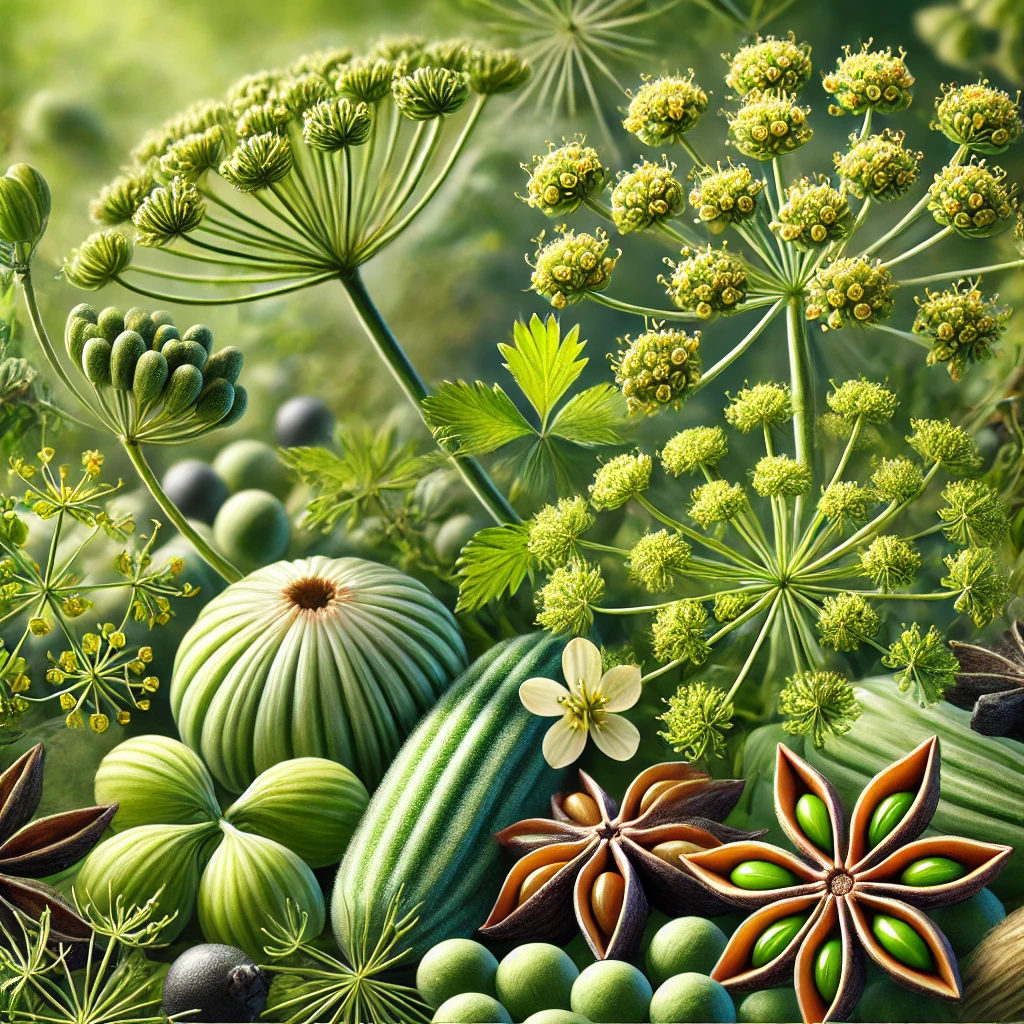
Plants With Licorice-Flavored Seeds
Introduction: The Magic of Plants With Licorice-Flavored Seeds
Plants With Licorice-Flavored Seeds is one of nature’s most delightful and universally loved tastes, often associated with candies and sweet treats. But did you know that this flavor extends beyond the licorice root and can be found in the seeds of various plants? These licorice-flavored seeds not only add a distinct taste to dishes and beverages but also come with a wealth of health benefits.
From improving digestion to boosting immunity, plants with Plants With Licorice-Flavored Seeds have been used for centuries across cultures. Whether you’re a culinary enthusiast looking to experiment with new flavors or someone keen on natural remedies, these seeds offer a sweet, aromatic solution. In this article, we’ll explore seven fascinating plants with licorice-flavored seeds that are sure to enhance your kitchen, garden, and well-being.
-Anise (Pimpinella anisum): The Sweet Classic Plants With Licorice-Flavored Seeds
Why Anise is Amazing
Anise is a plant that has been cherished for centuries for its delightful sweet, licorice flavor. Its seeds have a long history of use in both cooking and medicine. Originating from the Mediterranean region, anise’s tiny, crescent-shaped seeds pack a punch with their intensely sweet and aromatic flavor.
Health Benefits and Uses
Anise seeds are more than just flavorful. They are packed with medicinal benefits. They have been traditionally used to:
-
Promote digestion: Anise seeds help reduce bloating and gas, making them a popular post-meal remedy.
-
Soothe coughs: The seeds have mild expectorant properties, which can help clear mucus and ease respiratory issues.
-
Balance hormones: Anise is known for its mild estrogenic effects, which can aid women during menopause.
Culinary Uses
The licorice flavor of anise seeds is perfect for adding a sweet, aromatic touch to both savory and sweet dishes. You’ll often find anise in:
-
Baked goods like cookies and bread.
-
Beverages, including the famous French drink Pastis and the Greek Ouzo.
-
Sauces and stews where it adds a delicate licorice undertone.
Fun Fact: Anise has been used since ancient Egypt, and the Romans even believed it could ward off bad dreams! (Read more)
-Fennel (Foeniculum vulgare): The Versatile Healer Plants With Licorice-Flavored Seeds
The Power of Fennel
Fennel is a flowering plant that produces fragrant seeds with a warm, sweet flavor, similar to licorice but with a more herbal quality. This versatile plant is used not only for its seeds but also for its bulb and leaves, all of which have culinary and medicinal uses. Native to the Mediterranean region, fennel is now grown worldwide and is especially popular in Italy and India.
Health Benefits and Uses
Fennel seeds have been prized for centuries for their wide range of health benefits:
-
Digestive support: Fennel seeds are excellent for promoting digestion and reducing bloating. They are often chewed after meals in India to aid digestion and freshen breath.
-
Anti-inflammatory: Fennel seeds contain antioxidants and compounds that reduce inflammation in the body.
-
Hormonal balance: Like anise, fennel seeds can help balance hormones and are sometimes used to relieve menstrual cramps.
Culinary Uses
Fennel seeds add a delightful licorice-like flavor to a variety of dishes, making them a popular spice in:
-
Indian cuisine: They are a key ingredient in spice blends like panch phoron and are used in curries, pickles, and bread.
-
Italian cooking: Fennel seeds are often used to flavor sausages, breads, and sauces.
-
Teas: Fennel tea is soothing and helps improve digestion.
Fun Fact: The Romans believed fennel could provide strength and courage, and warriors would consume it before battles.
-Star Anise (Illicium verum): The Star of Spices Plants With Licorice-Flavored Seeds
Star Anise: A Powerful, Beautiful Spice
Star anise is a gorgeous, star-shaped spice with a strong, sweet licorice flavor. Native to northeast Vietnam and southern China, it’s a key ingredient in many Asian cuisines and traditional remedies. Star anise is both aesthetically pleasing and powerfully flavorful, with a taste similar to anise but more intense.
Health Benefits and Uses
Star anise is not just a culinary gem, but also a medicinal powerhouse:
-
Immune boost: Star anise contains shikimic acid, a compound used in the production of antiviral medications such as Tamiflu.
-
Digestive aid: Like other licorice-flavored seeds, star anise helps with digestion and can soothe stomach discomfort.
-
Respiratory support: Star anise is often used in teas and remedies to relieve cold and flu symptoms.
Culinary Uses
Star anise is a staple in many Asian dishes, but its uses extend beyond regional cooking:
-
Chinese five-spice: Star anise is a key ingredient in this famous spice blend, used to flavor meats and broths.
-
Pho: This famous Vietnamese noodle soup often includes star anise for its sweet, warm flavor.
-
Desserts: Star anise can add a unique twist to baked goods and desserts, particularly in combination with chocolate or citrus.
Fun Fact: Star anise is often used as a natural remedy for colds and flu in traditional Chinese medicine.
-Sweet Cicely (Myrrhis odorata): The Ancient Sweetener Plants With Licorice-Flavored Seeds
A Sweet, Licorice-Flavored Delight
Sweet cicely is an ancient plant that has been used both for its flavor and its medicinal properties. With seeds that have a delicate, licorice-like sweetness, sweet cicely was once used as a natural sweetener before the widespread availability of sugar.
Health Benefits and Uses
Sweet cicely offers a range of health benefits, making it a useful herb to have in your garden or pantry:
-
Soothes digestion: The seeds of sweet cicely can help alleviate indigestion and bloating, much like anise and fennel.
-
Diuretic properties: Sweet cicely is believed to support kidney health and act as a mild diuretic.
-
Natural sweetener: Before sugar became common, sweet cicely seeds were used to sweeten fruit dishes and desserts.
Culinary Uses
Sweet cicely’s sweet, licorice-like flavor makes it a wonderful addition to many dishes:
-
Fruit salads: The seeds add a natural sweetness to fruit dishes.
-
Baked goods: Sweet cicely can be used in desserts like pies and cakes to add a hint of sweetness.
-
Infused in teas: The seeds can be steeped in hot water to create a soothing herbal tea.
Fun Fact: In medieval times, sweet cicely was believed to have protective powers and was often grown near homes to ward off evil spirits.
-Black Cumin (Nigella sativa): The Spice of Life Plants With Licorice-Flavored Seeds
Black Cumin: Ancient, Healing Seeds
Black cumin, also known as black seed or Nigella sativa, is a plant that has been used for thousands of years in Middle Eastern and Indian cultures. Its seeds have a distinctive, slightly bitter licorice flavor that enhances both food and health.
Health Benefits and Uses
Black cumin seeds are renowned for their numerous health benefits, earning them the nickname “seeds of blessing”:
-
Anti-inflammatory: Black cumin seeds are known for their powerful anti-inflammatory properties and are often used to reduce swelling and inflammation.
-
Immune support: The seeds contain thymoquinone, a compound that boosts the immune system and fights infections.
-
Skin health: Black seed oil is often used topically to treat skin conditions like eczema and acne.
Culinary Uses
The licorice-flavored black cumin seeds add depth and complexity to a variety of dishes:
-
Middle Eastern cuisine: Black cumin is often used to season breads and curries.
-
Pickling: The seeds are commonly used in pickling spices.
-
Spice blends: Black cumin is a key ingredient in many spice blends, adding warmth and a hint of sweetness.
Fun Fact: Black cumin seeds were found in King Tutankhamun’s tomb, and they were believed to be essential for his afterlife journey.
-Lovage (Levisticum officinale): The Celery of the Gods Plants With Licorice-Flavored Seeds
Why Lovage Deserves a Spot in Your Garden
Lovage is an often-overlooked herb with licorice-flavored seeds that deserve more attention. Native to Southern Europe, lovage is a tall, leafy plant that resembles celery, and its seeds are prized for their sweet, herbal flavor.
Health Benefits and Uses
Lovage seeds are valued for their ability to:
-
Promote digestive health: Like other licorice-flavored seeds, lovage seeds aid digestion and reduce bloating.
-
Detoxify the body: Lovage seeds are believed to have diuretic properties, helping to flush toxins from the body.
-
Soothe joints: Lovage has been traditionally used to ease joint pain and reduce inflammation.
Culinary Uses
Lovage seeds are a fantastic addition to your kitchen, offering a flavor similar to celery with a hint of licorice:
-
Soups and stews: Lovage seeds add depth to savory dishes like soups and stews.
-
Salad dressings: The seeds can be ground and used to flavor salad dressings and sauces.
-
Seasoning for meats: Lovage seeds pair well with roasted meats and poultry.
Fun Fact: The Romans considered lovage to be a powerful aphrodisiac!
-Chinese Licorice (Glycyrrhiza uralensis): The Healing Root and Seed Plants With Licorice-Flavored Seeds
The Healing Power of Plants With Licorice-Flavored Seeds
Chinese licorice is a plant well known for its sweet root, but its seeds also carry a delightful licorice flavor. Native to China, this plant has played a significant role in traditional Chinese medicine for thousands of years.
Health Benefits and Uses
Chinese licorice seeds are known for their potent healing properties:
-
Soothing sore throats: Licorice is commonly used in teas and lozenges to soothe sore throats.
-
Supporting adrenal health: Chinese licorice is believed to help regulate cortisol levels and support adrenal health.
-
Boosting energy: The seeds and root of the licorice plant are often used to combat fatigue and improve overall vitality.
Culinary Uses
Although the seeds are less commonly used in cooking than the root, they can still add flavor and medicinal benefits to various dishes:
-
Teas: Licorice seeds can be steeped in hot water to create a sweet, soothing tea.
-
Herbal remedies: The seeds are often used in traditional Chinese medicine formulations to enhance the effects of other herbs.
-
Sweet treats: Licorice seeds can be used to flavor candies and confections.
Fun Fact: Licorice is often used in traditional Chinese medicine to “harmonize” the ingredients in herbal formulas, enhancing their overall effect.
The Many Health Benefits of Plants With Licorice-Flavored Seeds
Plants With Licorice-Flavored Seeds offer a wealth of health benefits, making them a great addition to your diet. Here are just a few reasons to include them in your daily routine:
-
Improved digestion: Many of these seeds, such as fennel and anise, are known for their ability to ease bloating and improve digestion.
-
Anti-inflammatory effects: Seeds like black cumin and star anise contain powerful anti-inflammatory compounds that can help reduce pain and swelling.
-
Boosted immunity: Licorice-flavored seeds are rich in antioxidants and other compounds that support immune health.
-
Respiratory relief: Seeds like star anise and Chinese licorice are known to relieve respiratory conditions, making them ideal for soothing coughs and colds.
Conclusion: Nature’s Licorice Gift Plants With Licorice-Flavored Seeds
Plants with licorice-flavored seeds are a beautiful example of nature’s bounty, offering both flavor and health benefits. From the sweet seeds of anise to the powerful properties of black cumin, these plants have been treasured for centuries. By incorporating them into your diet, you can enjoy their delicious flavor while reaping their medicinal benefits.
Grow them in your garden, use them in your kitchen, or add them to your wellness routine. These seven plants are sure to bring joy, health, and sweet licorice goodness into your life.



